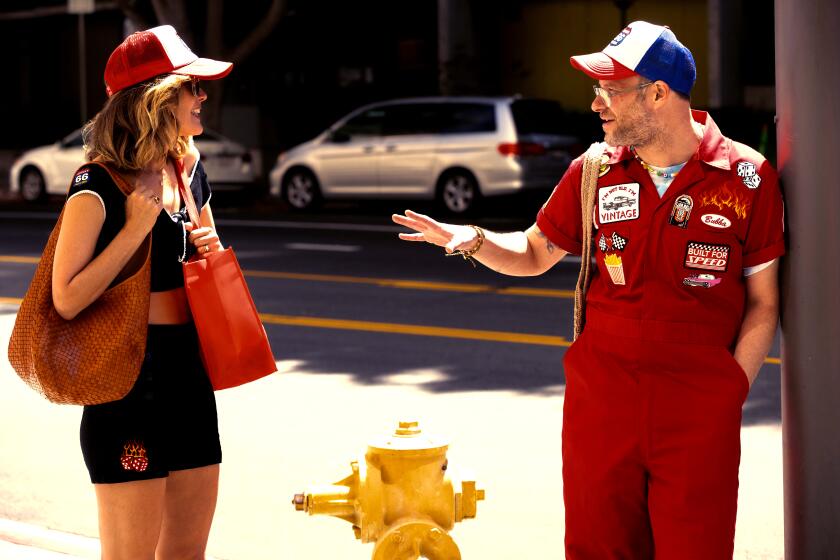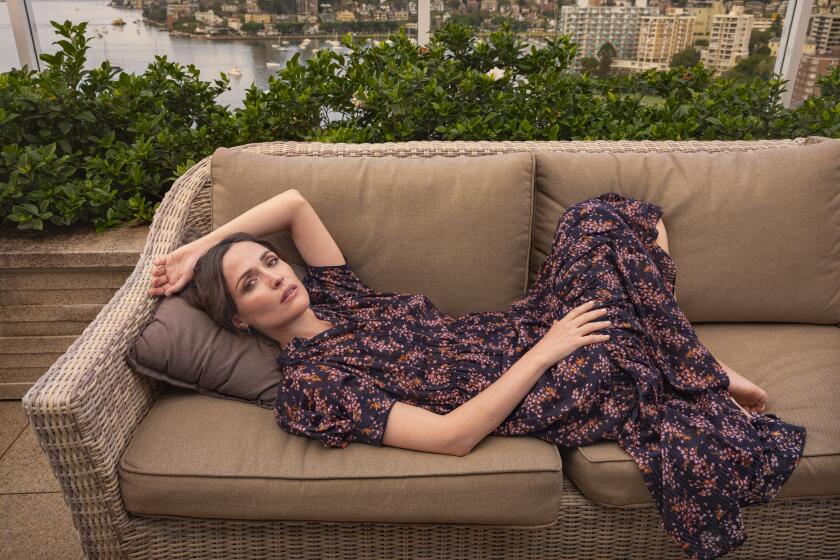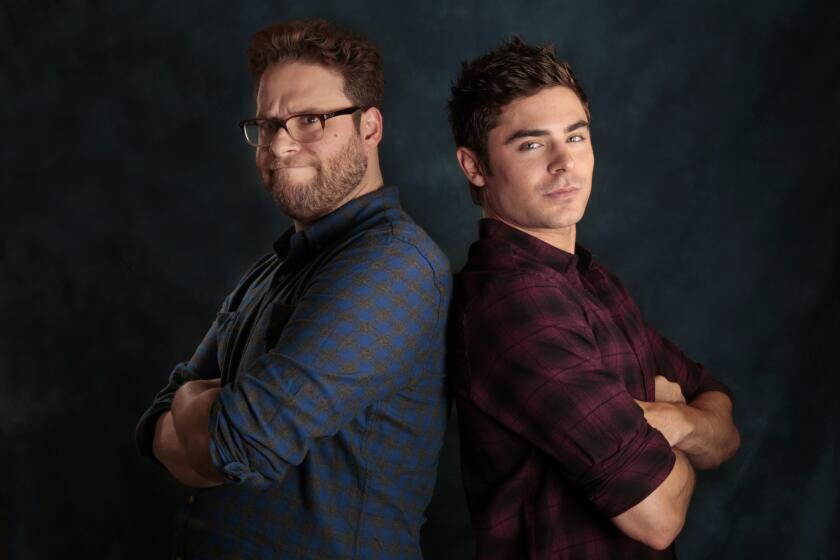Seth Rogen and Rose Byrne wanted to disrupt onscreen relationships. Enter ‘Platonic’
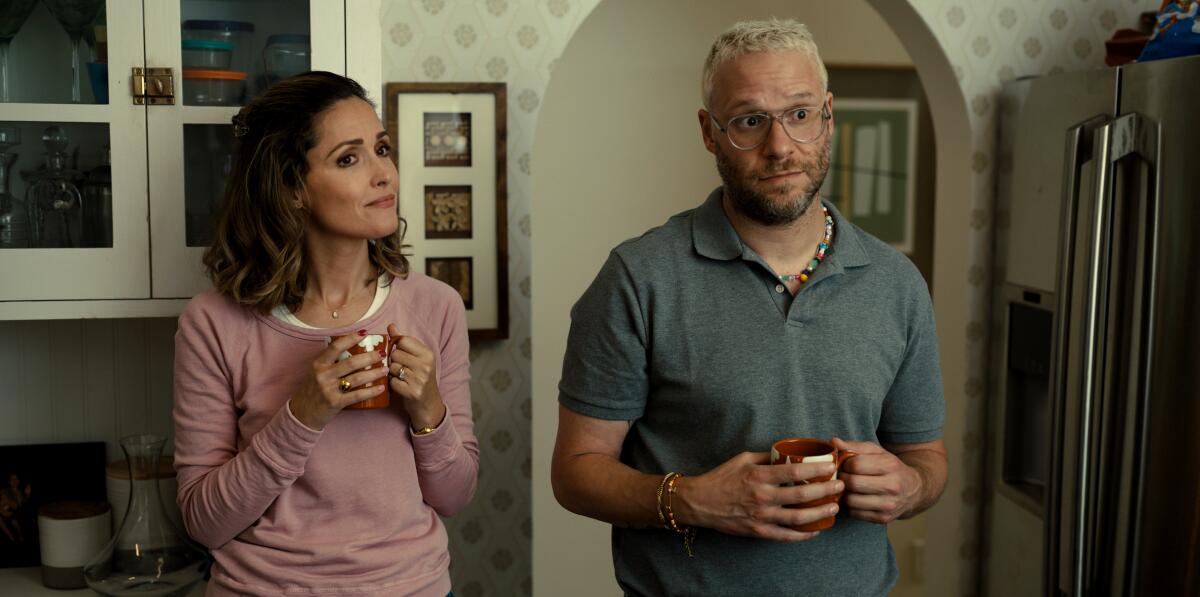
- Share via
“When Harry Met Sally” (1989): Men and women can’t just be friends.
“Platonic” (2023): men and women can just be friends, even after unknowingly snorting cocaine laced with ketamine.
In the Apple TV+ series, which premiered in May and dropped its fifth episode on Wednesday, Seth Rogen and Rose Byrne play estranged besties who rekindle their friendship at pivotal junctures in their lives. Sylvia (Byrne) is a married mother of three children who feels stuck in a loop of her housewife duties, while Will (Rogen) is a middle-aged hipster and bar co-owner going through a divorce. After spending their early adult years hanging out without making out, the two drifted apart after Will got married. But now, reunited, the pair are both rediscovering their friendship and themselves at a more mature stage in their lives.
This isn’t a will they, won’t they. They never will.
“There’s been many studies on how important those friendship relationships [are] and how much happiness they bring into your life as opposed to a romantic relationship or a sibling relationship,” Byrne says. “It’s a source of real, I think, security and comfort and steadiness. It’s work, though. The best friends in my life, it’s about upkeep and continuing — and a lot of my friends don’t live where I live. But as I get older, I just treasure them more and more.”
The series reunites Byrne and Rogen, who first starred together in the 2014 comedy “Neighbors,” about a young married couple with a newborn living next door to a wild frat house. (That film’s director, Nicholas Stoller, created “Platonic” with his wife, novelist and screenwriter Francesca Delbanco.)
“I have many flaws and one of them is maintaining constant communication with people that I should,” Rogen says. “It’s why it’s a thing I’m so drawn to — I work with my best friends. This show is kind of symbolic and meta in a way, as everything is when making a show. This is an opportunity to hang out with people that I like and I know that the most time I spend with people is when I’m working with them. It’s an opportunity for several old friends to get back together.”
Gathered over a video call, Rogen and Byrne talked about the friendship dynamic at play in “Platonic,” dismantling Hollywood tropes and shooting in Los Angeles.
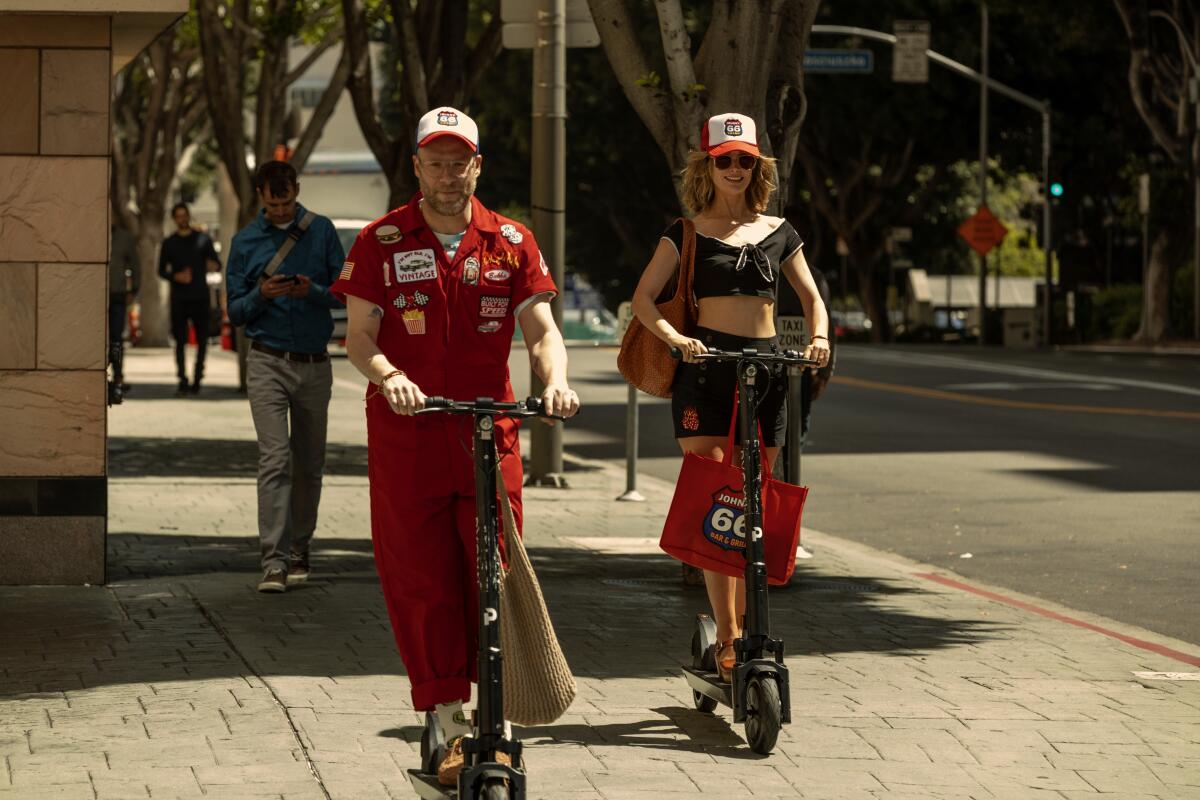
The series provides a different take on the classic question, memorably popularized in “When Harry Met Sally”: Can men and women just be friends? What had been your thoughts on that question? And how has it shifted with age or your relationship status?
Rogen: We’re both firm believers that platonic friendships between men and women are healthy, valuable things to happen in your life. And it’s honestly just one of those ideas, as people who both have those, when you hear the idea, you’re like, “Oh, yeah, why haven’t I done that?” And TV has kind of taken on this new structure, in some ways, where if this was the days of a 26-episode a year sitcom — well, honestly, [the premise] probably still would have worked. It felt very relatable, but at the same time, you’re like, “Well, then, why haven’t they really done that?” I’ve done so many things focusing on male-male friendships that, again, it was one of those things where it’s like, “Oh, we’ll get to do a lot of the stuff that we know is funny and we know works and people like, but we get to do it in a way that is totally original or not at all the way we’ve done it in the past.”
Byrne: And I just think the show sort of sets up [with that question in mind], but it ultimately isn’t really about that. It’s just about this specific friendship and it’s more the reactions of their family and their friends who are commenting on it, which does happen and has happened to me in my life with male friendships. People [are] commenting, like, “Are you guys together or not?” And really kind of obsessing over it. I also think it’s generational. I think the generation above us are probably more conservative and the generation below us are way less; this is the last thing they’re thinking about.
Rogen and Byrne reunite in this Apple TV+ series, premiering Wednesday, about two best friends who reconnect after a rift.
What’s great about this series is it’s not concerned with amping up the sexual tension between Will and Sylvia. It’s more demonstrating the tension their nonsexual intimacy creates in the rest of their lives and, as a viewer, you find yourself asking how you would react or feel about the dynamic. Did you find yourself asking yourself how you would feel in this situation?
Byrne: I do, often, try to relate my life. That’s why I think it’s interesting because obviously the show is a comedy and it’s dealing with these conversations through a comedic lens. So it’s amped up; it’s overblown; it’s definitely got an element of that to it. And Sylvia and Will are also having separate midlife crises or whatever. And I do think it probably would be problematic if I did act like this or do these things while having three children, and it becomes problematic in the show. There’s no show without stakes. But that’s what’s fun about it too, because you get to compare that to your own life and to other friendships and other relationships. And every relationship is unique too. Every relationship has its own set of rules that only people in the relationship knows or understands.
From Crawford to Tony Soprano, Byrne explains the inspirations for her performance as a tormented aerobics instructor in Apple’s new show “Physical.”
Rogen: I think my character is in such a different place in his life and it’s so not comparable. There’s friends that I’ve had, that I’ve known, before I met my wife; we’re still friends, and I go hang out with them. And no one thinks that weird. I do know guys who are single and my age and some guys were divorced and my age. To me, it was more kind of tapping into these guys who, in their heads, think they’re doing very well, but it’s very apparent that they’re not.
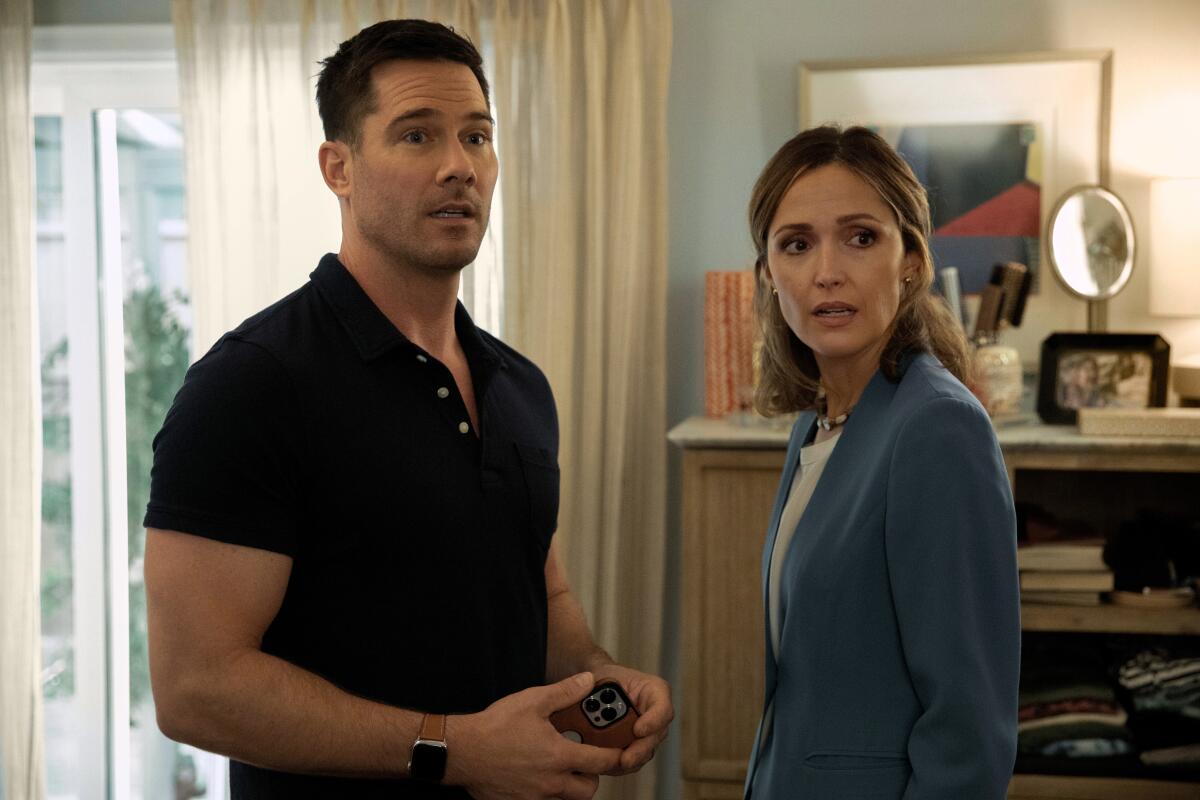
As viewers, we’ve been conditioned to root for something to happen in dynamics like these. But here, you’re not rooting for that. Charlie, Sylvia’s husband as played by Luke Macfarlane, is a good guy. And Seth, you’ve talked about your discomfort with mixing the topic of infidelity and comedy together. It’s not something I ever considered thoughtfully. And I wondered if you could walk me through how you arrived at that decision?
Rogen: It’s more just like what you as an artist are interested in exploring, what you personally find interesting and meaty and right for interesting conversations and conflict. And my personal experiences with infidelity are not ones that have inspired me creatively. [laughs] That’s a part of it. There’s great things about infidelity that are hilarious, and I like these things and watch these things. But, for me, it was just not something that I wanted.
When someone I know is writing a movie, or I’m helping someone write something, you got to make the stuff that you want to make and it should be about the stuff that you find interesting as artists and as people who are creative. As they were pitching me the show, I was just like, “I personally don’t want to dedicate hours of every day for months into exploring the nuances of infidelity. I just don’t think that is where I want to dump my creative energies.” But this idea of friendship I liked. To me, what’s much more interesting, and it’s something that we kind of did with “Neighbors,” is looking at how movies and television have settled into these tropes that are based on regressive thoughts at times. With “Neighbors” it was a big one. Like every movie with a husband and wife, they f— hate each other. Period. That’s the joke. The joke is they hate each other. They don’t have sex enough, they’re angry, they lie to each other, they tell secrets.
Byrne: The wife is a nag.
Rogen: The wife is a nag, the guy is a lovable idiot. We were like, “Let’s not do that with ‘Neighbors.‘” That’s not reflective of any relationships that I was a part of or knew people that were a part of it. And so with this, it was the same thing, where you’re like, it’s always about sexual tension. And all of us, hopefully, have very normal friendships with people of the opposite sex that are in no way about that. And it’s not a part of it; it’s more about what big a— they are and how neglectful they are and how resentful they are, jealous they are and how they misled you or misrepresented things that has nothing to do with that you secretly want to f— each other, you know? To me, that was interesting. Let’s explore that!
Byrne: We wanted Sylvia’s marriage with Charlie, Luke McFarlane’s character, to essentially be a really good marriage, rather than her being in a really unhappy marriage and trying to escape. It’s not that, it’s other stuff.
One of my favorite scenes in this series is when they end up doing CK [cocaine laced with ketamine] and Sylvia stumbles through the rest of the evening [in Episode 4], or when Will is doing the ”Coyote Ugly” dance on the bartop [in Episode 5]. What were your favorite moments from each other?
Rogen: Yeah, the CK stuff was pretty funny and the stuff in the convenience store. Any time Rose was high or f— up on the show, it was really just very entertaining and very, very funny.
Byrne: Seth does some really good raccoon, animal work [in an upcoming episode].
Rogen: Oh, yeah. [laughs] I got in there with that thing. I got it. We could not afford a CG raccoon, I’ll tell you that.
Byrne: A real raccoon. That stuff is very hard to sell and, whether you know it or not, he’s actually adept in it and fluent in that performance with those sorts of things.
Rogen: I’m like Davy Crockett.
Byrne: You are. You are. And that was not only entertaining, but also very impressive.
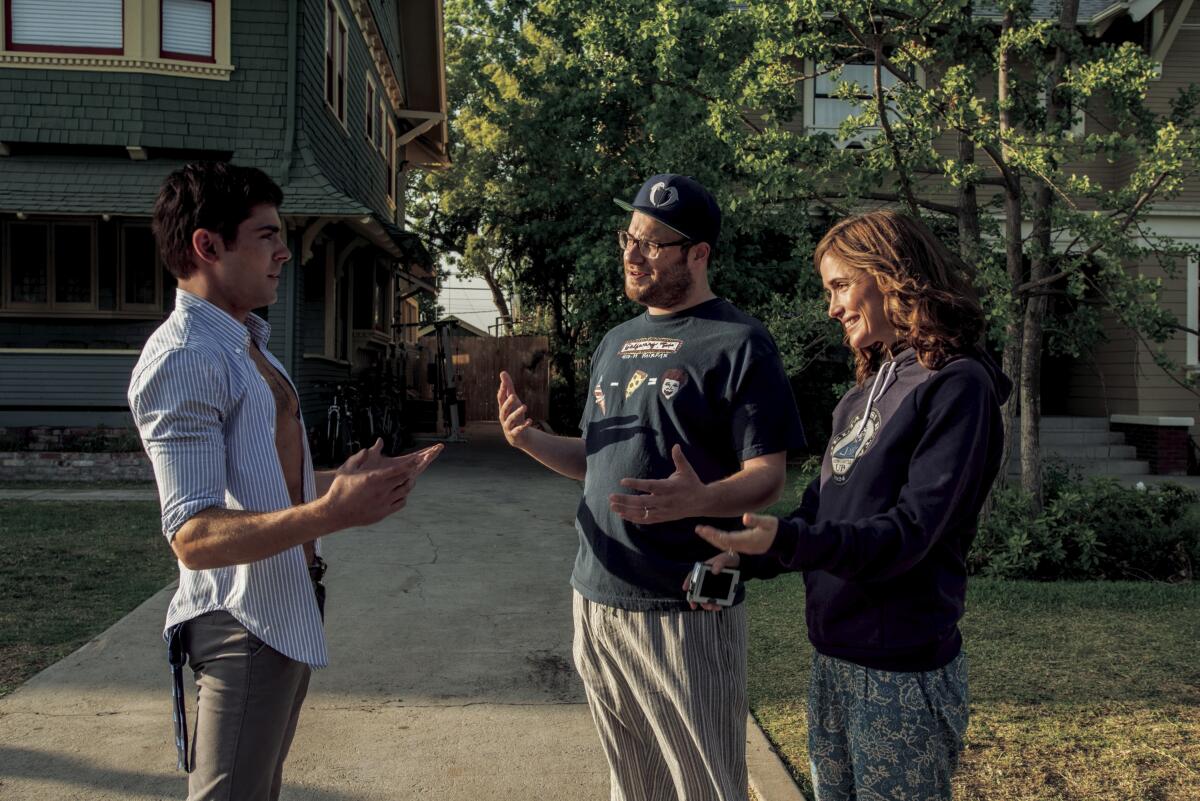
A glance across the room at an awkward Hollywood awards show party first united Zac Efron and Seth Rogen.
How did playing friends as opposed to husband and wife shift the dynamic or looseness in creating the funny moments?
Rogen: We noticed the difference, yeah.
Byrne: Yeah, a couple of weeks in, I was like, “This is a bit different.”
Rogen: Well, we don’t love each other. You’re just nicer, hopefully, to your spouse. Especially in “Neighbors,” we were a good couple who fundamentally really loves each other. You’re just much nicer to those people, you’re more forgiving of them. If you love your partner, then maybe you don’t say that one really mean thing that you know is gonna blow up into a fight. Also, in “Neighbors,” the joke isn’t that we are in conflict with one another. The joke more so is that we are on the same team battling another team. So, that’s what was fun [on “Platonic”], was being able to really kind of be combative with one another while not playing into this husband and wife, hate-each-other trope, but instead playing into what felt like a much fresher, new dynamic.
Byrne: This was different. We were more mean to each other. This friendship was way more like winding each other up, pushing all the buttons that you do with a brother or a sister.
Los Angeles is in all its glory in this series. You’re shooting in downtown, you’re shooting in all these places. Does any experience stand out?
Rogen: I would say it’s contributed to the energy overall. I like energy. I’ve worked with some actors who maybe are from like theater; they like a very contained environment. They like to really know what’s gonna happen at all times, for there not to be any kind of curveballs, and to [have a] really protected feeling. I came up in a much more chaotic acting environment. I like the element of surprise. I am very comfortable knowing anything might have changed or shifted any second so I thought it was fun shooting outside and downtown. It added adrenaline and energy to the scenes and it was cool.
Downtown L.A. has changed a lot over the years. And it was funny, I was actually out to dinner a few nights ago, a few blocks from where we were shooting, and so many guys who look just like me on the show came up to me to tell me how much they like the show, which was really hilarious and nice. But yeah, I love L.A. Also, as a film fan, one of the things I love is how different movies show off different parts of the city. And as someone who’s lived in L.A. for a very long time now, I thought it was cool to show off the Arts District and a part of downtown that most people who don’t live in L.A. are probably not at all familiar with.
Byrne: That day at the Starbucks was pretty crazy.
Rogen: It’s true. If you want to know literally the craziest part of all of Los Angeles, go to that Starbucks in like the middle of downtown. I think it’s on Grand, maybe, at like 11 a.m. and it’s —
Byrne: It was chaos. We were shooting a really important scene where they see each other in the pilot — it’s pivotal, it’s awkward, it sets it all up. And the people walking in and out, it was believable. It couldn’t have been more obvious we were shooting and people were just like, “What’s going on?” We barely got through it.
‘Platonic’
Where: Apple TV+
When: Any time
Rating: TV-MA (may be unsuitable for children under the age of 17)
More to Read
The complete guide to home viewing
Get Screen Gab for everything about the TV shows and streaming movies everyone’s talking about.
You may occasionally receive promotional content from the Los Angeles Times.
